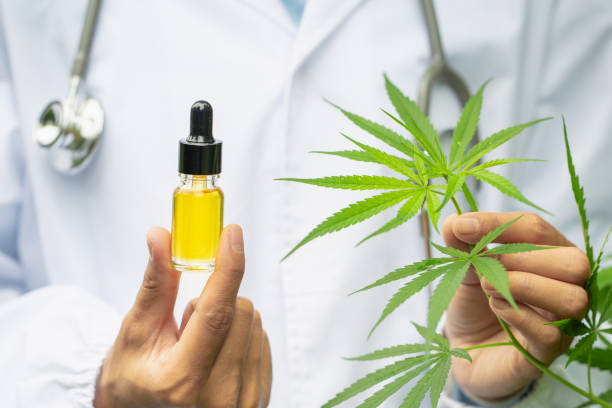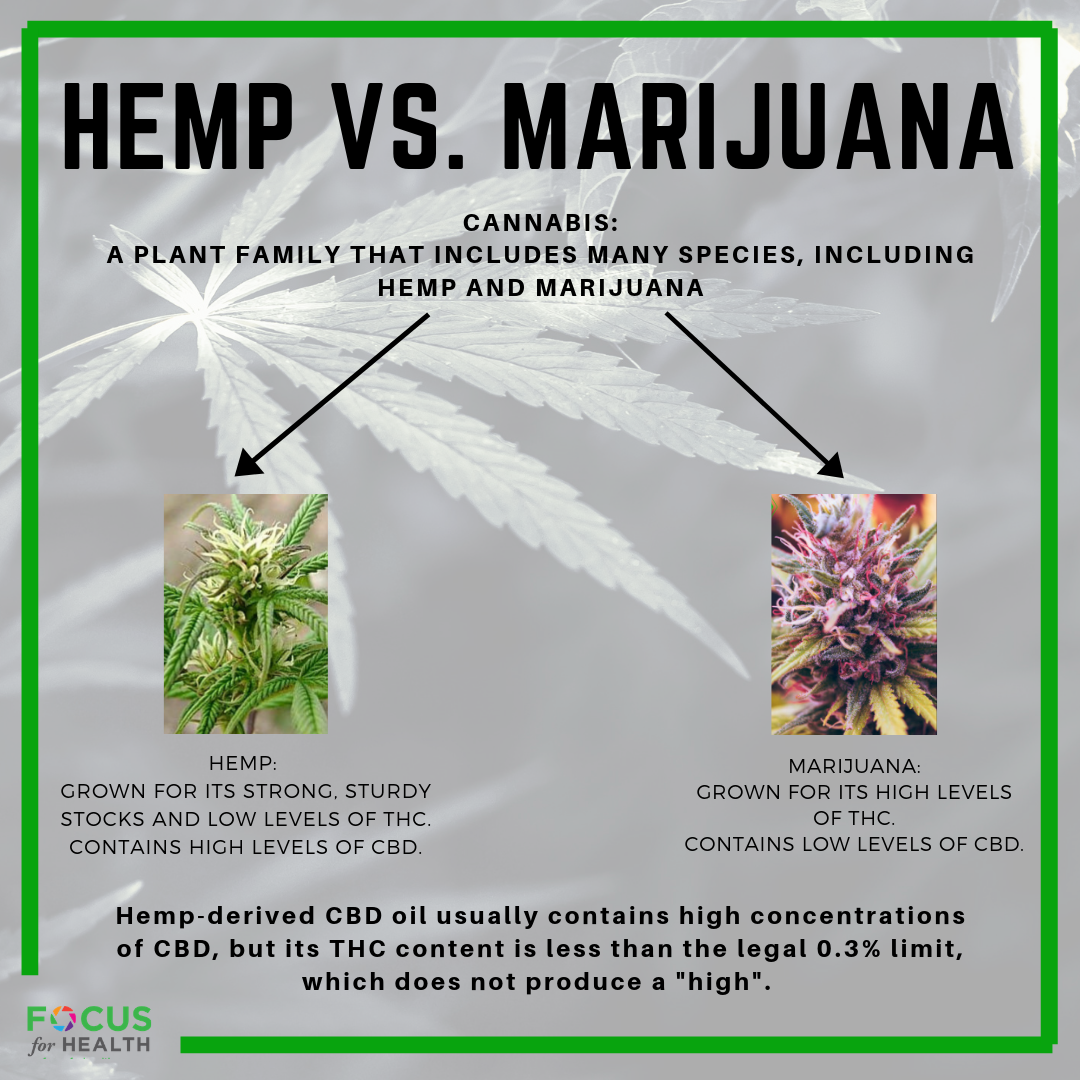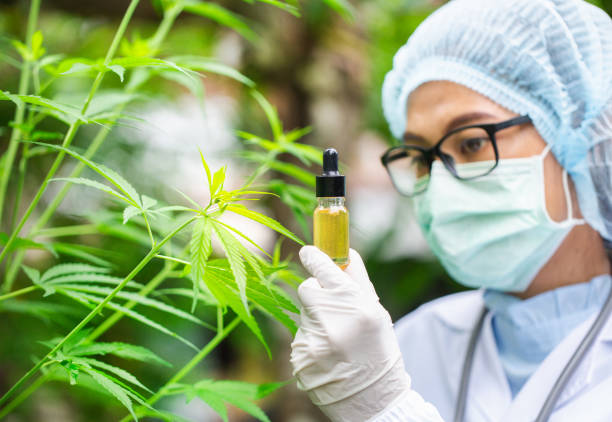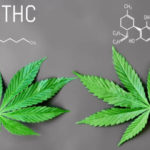
Cannabis was readily available for millennia. The first documented use of cannabis-based medicine was from 2737 BC by Chinese emperor Sheng Nung, who used cannabis-infused tea to treat memory, malaria, rheumatism, and gout. An Irish physician named William B. O’Shaughnessy conducted a study on cannabis’ therapeutic effects in 1839, which was quite controversial at the time. It wasn’t until 1940 that an individual cannabinoid was discovered by a chemist named Robert S. Cahn, and it took two years for Dr. Roger Adams to successfully isolate the first cannabinoid, known as cannabidiol (CBD). Dr. Adams’ research has also been lauded as the first step towards the discovery of tetrahydrocannabinol (THC). Comparatively, THC was isolated in its purest form and had its structure explained shortly after 1963 by Dr. Raphael Mechoulam.
What Is + Legality
CBD is the second most prevalent of the active ingredients in Cannabis plants. It’s derived directly from the hemp plant, not the marijuana plant. Legally speaking, marijuana plants are prohibited by the Food and Drug Administration. Scientifically speaking, hemp and marijuana belong to the same genus but are of a different species. The most important difference between the two is tetrahydrocannabinol (THC) content. THC is the foremost active ingredient in marijuana and is the compound responsible for the altered state of consciousness (aka getting high). By comparison, hemp plants contain no more than 0.3% (by dry weight) of THC, meaning that you won’t be able to get high off hemp plants. Any cannabis plant with over 0.3% THC content will produce a high and is illegal on the federal level. Any cannabis plant with under 0.3% THC content is a hemp plant, will not produce a high, and is not illegal on the federal level. Due to the complexity of marijuana law on a federal and state level, please refer to the Marijuana Policy Project’s state policy map, as well as NORML’s law database.
It’s important to note that the 2018 Farm Bill removed legal restrictions on CBD if it’s derived from hemp plants. Previously, all cannabis plants were considered the same, and thus, banned entirely. The hemp provisions removed hemp from the definition of marijuana, and even though THC is a Schedule I controlled substance, an exception was created specifically for THC in hemp. What remains to be seen is how the Food and Drug Administration (FDA) will regulate CBD moving forward. On June 16th, the FDA released a document stating that adding CBD to a food or labeling CBD as a dietary supplement is currently illegal under federal law. Despite the confusion of the legality of the plants, people very much want access to CBD for medical and therapeutic reasons.
CBD To Treat Autism?

Using CBD to treat autism has been gaining steam within many social circles. Since CBD is generally better tolerated and is significantly cheaper than prescription drugs, there has been a growing chorus of those willing to, at the very least, investigate what CBD may offer those living with autism. A study published in Gastroenterology & Hepatology stated that the most prominent motives for using medical marijuana were ineffectiveness of current therapies, fewer side effects, and a sense of gaining control over the disorder. Using CBD to treat specific symptoms appears to be an increasingly effective course of action, as CBD has been shown to address issues involving the microbiome, mental health, sleeplessness, and many other areas.
CBD + Microbiome
Recent evidence has strongly tied autism symptoms to gut microbiomes. Look no further than fecal transplants greatly reducing autism symptoms and a dietary and prebiotic intervention resulting in improvements in antisocial behavior as proof that this is a burgeoning field of research. CBD has been shown to have protective effects on the digestive system in several ways. When studied in rats, CBD was used to treat severe colitis and “greatly reduced parameters of colitis, including inflammatory damage and diarrhea”. Most studies focus primarily on mice, simply because the ethics (and legality, due to cannabis being a Schedule 1 drug) are too dicey to place before an ethics review. According to a review of data published in Cannabis and Cannabinoid Research, CBD has been associated with improved blood vessel lining (endothelial integrity), and may be a novel approach to addressing issues within the gut microbiota. This is important, as it aligns with research published in Nature Reviews Endocrinology that strongly associates the endocannabinoid system and related lipids with a number of processes, such as inflammation, type 2 diabetes, and obesity. Gut microorganisms and the endocannabinoid system are intertwined, meaning that any intervention that would utilize the endocannabinoid system as CBD would have an opportunity to make meaningful progress in treating these conditions. Understanding the relationship between human endocannabinoid systems and how it can be targeted to address these illnesses will be critical moving forward.
CBD + Symptom Reduction
The science regarding CBD’s effects on mental health paint a rather clear picture. CBD increases levels of endocannabinoid called anandamide, creating anti-inflammatory effects. CBD also increases serotonin signaling and has been associated with decreasing anxiety and an improved ability to protect brain cells from death. CBD has been shown to protect the brain from oxidative stress, which has been associated with symptoms of autism. Oxidative stress is increased in those with autism, and oxidative stress decreases the levels of antioxidant serum proteins. These proteins are associated with acquired language skills, further highlighting the possibilities for CBD-based interventions to combat decreasing social skills.
Researchers at the University of California San Diego are conducted a clinical trial involving 30 children, each diagnosed with autism and severe symptoms. The intent of this study is to better understand how CBD interacts with or alters neural activity, as well as measuring if CBD effectively and safely alleviates some of the more problematic symptoms of ASD, such as aggressive behaviors, self-injurious behaviors, hyperactivity, and social/communicative deficits. Research published in Scientific Reports found that cannabis oil containing 30% CBD led to improvements in specific symptoms. 89% of those studied showed decreased frequency of restlessness and rage attacks. In fact, 20% of patients had their sleep problems disappear entirely. The following symptoms were decreased at rates above 80%: agitation, anxiety, seizures, tics, and depression. Quality of life assessments were conducted, and the amount of those who reported “good quality of life” doubled from 31.3% of patients prior to treatment to 66.8% six months after treatment. The study further goes on to indicate that many patients were taking medications, and that nearly 25% of those taking antipsychotics either decreased their dosage or stopped taking this medication altogether. Ultimately, these researchers found that CBD in autism spectrum disorder patients (ASD) “appears to be well tolerated, safe, and an effective option to relieve symptoms associated with ASD.”
Further Research

The study of CBD has a long way to go before it becomes the standard or even an acceptable alternative. Dosages and the form in which cannabis is provided makes a world’s difference. Cannabis appears to be the most bioavailable when inhaled but burning cannabis in a wrap comes with a host of issues that could negate the positives of the cannabis. As a result, it is recommended that CBD is vaporized, which cuts out the harmful effects of smoke, nicotine, and tobacco. More research needs to be done on a host of issues, and the research needs to be pointed. It is important to have research to explore the long-term effects of cannabis use, best delivery system, impact on glutamate concentrations in the brain, as well as glutathione in the blood, and the establishment of generally safe dosages for various age groups and conditions.
Autism rates are rising nationwide, possibly due to better surveillance systems, environmental agents, or other factors. Nevertheless, it’s in our society’s best interest that we do the absolute best we can for those living with Autism Spectrum Disorders (ASD). Though the rise in prevalence of ASD is a new phenomenon, we might want to explore some very age-old, traditional remedies, to add to our toolbox of possible interventions.






can delayed speech be treated with cbd oil
There are no comprehensive studies that have shown CBD oil to be clinically effective in treating Autism. Some reports show a decline in aggressive behavior, a significant decrease in seizures, and improved speech. There are anecdotal stories of children who did not speak before treatment but showed significant improvement in speech following use of CBD oil. The staff at FFH present these articles as a very brief overview of a topic with the hopes that individuals will do their own deeper research. We hope that you find something that might be of value for you and your family members.
Can you recommend cbd oil for aggressive and self-injurious behavior for adults with autism. If so, can you please recommend one.
Many thanks
Katerina
My son use a tincture with 1.3ml of thc and 16.4ml of CBD, it has help so much. Depending on the state you live in, you can get a medical marijuana card. I highly recommend it, he is so much happier and more verbal as well, self injurious behavior has dropped 90%
Louis, is your son on any antipsychotics? I want to try the same thing but my son also takes risperidone. thanks
Anyone leaving in canada can help wITH THIS MATTER IM SO LOST AND DONT KNOW WHERE TO TURN OR WHAT DOC WILL HELP
I love your writing on CBD Oil and Autism. Your post is very much helpful and informative. Keep up the good work and present us your best.
Will this help 15 yr old girl with aggression
What a fantastic article! I love reading the scientific research! I have personally seen first hand many children that have had phenomenal results with a specific brand. Thank you to my friend http://WWW.Facebook.com/MichelleHerrera824 for being such an amazing mom and advocate for CBD and children with autism! If anyone wants info please feel free to reach to her. Hopefully the profile link will work so you can find her!
It’s not working for me but I would really like to get in contact with her
I live in North Carolina and My son is 11 years old weighs 82 lbs and has Autism, Bipolar Disorder with Moods and Psychosis. I’m stressed, depression, he fights me and his 5 year old brother and more. I asked his Doctor about CBD Oil and he said he will back me up on it but I don’t know which way to go there is so many places with the oil I need the right one. Can somebody please help me
Go to a vape shop and ask for a ticture which is not vapable but is an oil that must be held under the tongue or swisher around the gums do 30 seconds to 1 minute. I recommend 3 to 5 mg but talk to the doctor about the dosage he/she recommends. Vape shops always have high quality oils that are also affordable.
My son has Bipolar 1 and unfortunately it did nothing for him just made him tired. He must take a mood stabilizer and an anti-psychotic. However I have aspergers and anxiety and xbd is the only thing that helps me. Of course everyone is different so work with a doctor for your son abt these things and good luck 🙂
Did you ever find the right CBD you were looking for ?
Will CBD oil help my 4 year old autistic son. Who is non verbal with self injurious behavior? If so what one works best ??
We’re on the same page, i am currently searching for CBD on amazon and doing more research as far as how much is safe and what’s the best quality ?? Good luck to you both ?
Hi Daniela,
I live in Canada. My Dr gave me a medicinal marijuana prescription. I order my cbd oil from Aurora. I also make my own and put it in capsules. It works best if you use a dropper and put the cbd under the tongue. Make sure you’re getting the real cbd made from the marijuana plant, many have bought what they thought was cbd oil, only to find out it was Hemp oil. Doesn’t work like the real cbd. I wish all of you luck in finding the right cbd. ??
Still searching for the right CBD. All I say is do research. Reach out if I can help
Hi everyone,
I have a 6 year old who has been on cbd oil for two years. We use Healthy Hemp Charlotte cbd oil stage 1. It’s helped so much for my non verbal daughter. I don’t let her take any other medication but this helps a lot. She talks more, she’s calmer and more affectionate. We add it to her milk in the morning and at night. We can see a difference without it bc she gets a little violent without it. It helps me as the parent bc she is so much easier to communicate with bc she’s so calm
Hello, my 2. 5 year old son’s speech has been delayed and he has some social issues when interacting with other children. He is the only child though. He can name many things, speaks in 1-2 words and understands what he is told to.
Do you think CBD oil would help him? Which dosage? Thank you.
My son is 3 and very delayed speech as well as having and ASD diagnosis. His doctor recommended 15-20 mg of CBD daily to help improve his speech. It has been working too! I am hearing him talking more and more each day! I get my CBD oil from lazarusnatural.com. They even have a 60% discount if you submit a diagnosis.
Excellent article
I’d like to post a quick note on the safety of CBD oils. Independent research continues to highlight the fact that CBD isn’t currently regulated and as many as 70% of companies tested are found to have mislabeled products (more/less CBD) and/or excludes some testing due to failed results. Prior to purchasing any CBD product, always check the 3rd party COA testing for for the following: Cannabinoids, terpenes, residual solvents, pesticides, heavy metals, and microbials. If any of the tests are missing- assume they fail. I think it is critical for parents to know this!
Thank YAHWEH GOD for cdb oil & cannabis plant..
How much should I give to a six years old son who has autism and non verbal? Hoping to gain speech and help with anxiety. TIA!
Thanks for sharing information. keep sharing
Thanks for sharing information. keep sharing
This article is perfect. My nephew is on the autistic spectrum. It has been a frustrating experience for us because the doctors weren’t able to diagnose it initially. And when they managed to get it right we had to rush with the treatment because the doctors asked us to so he can keep up with other children his age.
Problem is, the medications he was prescribed seemed too strong for him. At least based on how he was responding. We are definitely talking with the doctor about using or at least testing out CBD as a possible alternative and see if that works.
This article gives me hope that it will work
Thanks everyone for participating in the discussion. I really appreciate it!